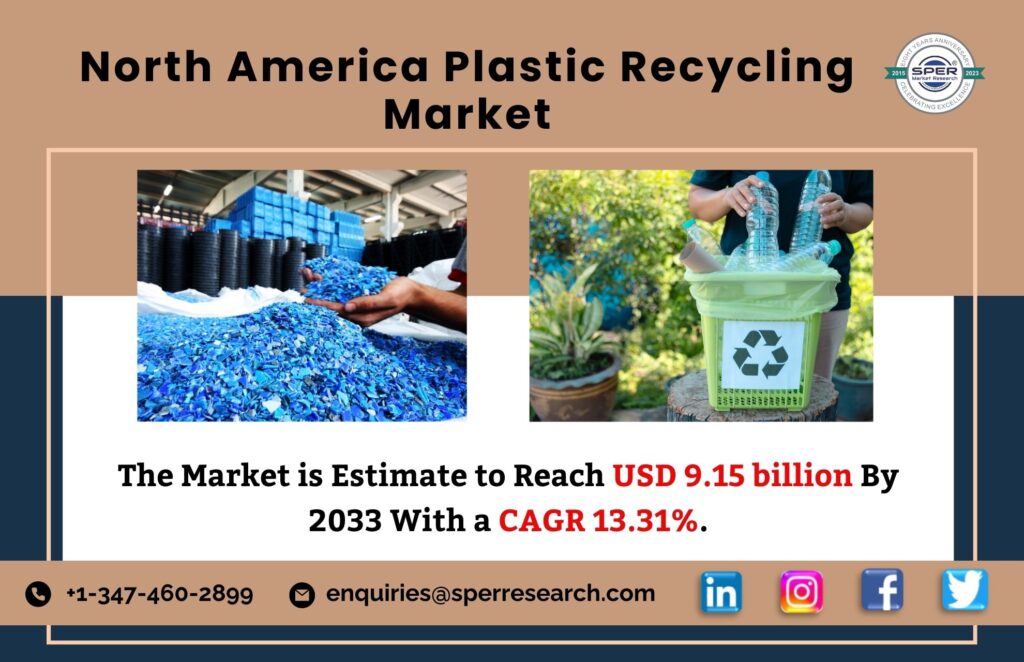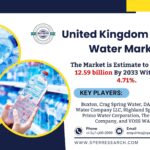Plastic can be conserved and reused, non-renewable fossil fuels (oil) reduce the consumption of energy used in the production of new plastic reduce the amount of solid waste going to landfill reduce emission of gases like carbon dioxide into the atmosphere. The process of recycle goes like Sorting is primarily automated, with a manual sort to check that all impurities have been removed. Once sorted and cleaned, plastic can be shredded into flakes or melt processed into pellets before being moulded into new goods. Recycled plastic can be used to make a variety of items, such as: beverage bottles and food tray Polyester fabric for clothes. Wheeled bins and food caddies waste sacks.
According to SPER Market Research, ‘North America Plastic Recycle Market Size- By Plastic Type, By Application, By Raw Material- Regional Outlook, Competitive Strategies and Segment Forecast to 2033’ states that the North America Plastic Recycle Market is estimated to reach USD 9.15 billion by 2033 with a CAGR of 13.31%.
Consumers’ growing environmental consciousness has resulted in a movement toward eco-friendly shopping practices, such as a preference for products created from recycled materials. This trend is encouraging manufacturers and companies in a variety of industries, including packaging, automotive, and consumer goods, to use recycled plastics in their products. Companies who provide novel solutions to increase the quality and performance of recycled materials, such as better sorting and purification technologies, can take advantage of these opportunities. Furthermore, activities that educate consumers about the benefits of recycling and promote responsible consumption increase demand for recycled products, establishing a strong market ecosystem that values sustainability.
Discover valuable insights by downloading our complimentary report. Click here to access your free sample – https://www.sperresearch.com/report-store/north-america-plastic-recycling-market.aspx?sample=1
Recycled plastics frequently face price competition with lower-cost virgin materials, especially when crude oil prices are low. This price gap may prevent producers from using recycled materials, particularly if the expense of obtaining, processing, and certifying recovered plastics outweighs the savings or environmental benefits. Furthermore, changeable market conditions and price volatility add to the economic uncertainties of recycling projects. Achieving price parity and enhancing cost-efficiency through economies of scale, technological advances, and supportive regulations are critical steps toward eliminating market resistance and fostering widespread adoption of recycled plastics in multiple industries.
The economic consequences from COVID-19 had far-reaching consequences for the plastic recycling industry, influencing investment decisions and regulatory actions. Economic uncertainty and reduced income put a burden on budgets for waste management and recycling infrastructure expenditures, postponing planned expansions and technical upgrades. Furthermore, shifting oil prices and market volatility reduced the cost competitiveness of recycled plastics when compared to virgin materials, affecting profitability and market dynamics. On the policy front, governments shifted their focus toward public health and economic recovery, potentially diverting attention and resources away from sustainability efforts and regulatory frameworks that promote plastic recycling.
The United States dominates the North American plastic recycling industry because of its enormous infrastructure, solid regulatory framework, major investments in innovation, high consumer demand for sustainable products, and strong public-private partnerships that promote recycling activities. Agilyx, Brightmark LLC, PLASTIPAK HOLDINGS INC., MBA Polymers Inc., Custom Polymers, UltrePET LLC, KW Plastics, Carbonlite Inc., Seraphim Plastics, Post Plastic Inc., Others are the key players of the market.
North America Plastic Recycling Market Segments:
By Plastic Type:
- Polyethylene Terephthalate(PET)
- High Density Polyethylene(HDPE)
- Polypropylene(PP)
- Low Density Polyethylene(LDPE)
By Raw Material:
- Plastic Bottles
- Plastic Films
- Rigid Plastic and Foams
- Fibres
By Application:
- Non-Food Contact Packaging
- Food Contact Packaging
- Construction
- Automotive
For More Information, refer to below link –
North America Recycled Plastic Market Share
Related Report –
Follow Us –
LinkedIn | Instagram | Facebook | Twitter
Contact Us:
Sara Lopes, Business Consultant – U.S.A.
SPER Market Research
+1-347-460-2899



